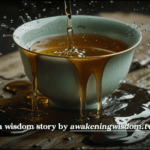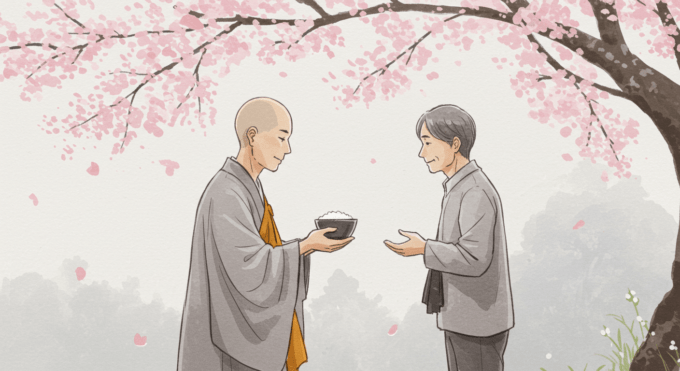A Storm Within
Emma’s heart pounded relentlessly in her chest, matching the chaotic rhythm of the bustling office around her. She stared blankly at her laptop, the screen cluttered with unread emails and looming deadlines. Every notification felt like an alarm, triggering waves of anxiety and panic that had become her daily companions. She had achieved everything she’d ever dreamed of, a successful career, a beautiful apartment, financial security but peace of mind always seemed just out of reach.
As the day wore on, Emma found herself increasingly trapped in a storm of digital noise, workplace tensions, and internal doubts. The more she chased productivity and control, the more distant they became. Frustrated, she pushed her chair back from the desk, took a deep breath, and closed her eyes, desperate for a moment of clarity amidst the turmoil.
Her phone buzzed again, and she opened her eyes to see a text from a friend: “Have you ever heard about the power of Stoicism? It’s changing my life.”
Emma paused, intrigued yet skeptical. She knew vaguely about Stoicism, some ancient philosophy, but could something thousands of years old really ease the modern chaos that had consumed her life?
She glanced around her cluttered office, the storm still raging within her. What did she have to lose?
An Ancient Book, A Modern Answer
That evening, Emma found herself standing in the quiet corner of a bookstore, holding a worn copy of Marcus Aurelius’s Meditations. The old, leather-bound book seemed oddly out of place among the sleek bestsellers and brightly colored self-help guides. But something about its timeless simplicity drew her in. Hesitantly, she flipped through its pages, her eyes catching random passages filled with ancient wisdom and reflections.
Later at home, curled up on her sofa, Emma began to read. Initially, the words felt distant, like whispers from an era long past. But soon, the lines started resonating deeply, each passage speaking directly to her turbulent mind:
“You have power over your mind—not outside events. Realize this, and you will find strength.”
Emma paused, rereading the line several times. Could the power of Stoicism truly help her reclaim control over the chaos she felt inside? Could this ancient philosophy provide genuine answers to the modern anxieties and pressures she faced every day?
Determined to test this newfound wisdom, Emma jotted down key Stoic principles, acceptance, emotional control, and focusing only on what could be changed. Tomorrow would be her first step in truly applying the power of Stoicism in daily life. For the first time in months, she felt a glimmer of hope and curiosity about what the next day might bring.
Facing Chaos with Stoicism
The next morning, Emma entered her office with cautious optimism. Armed with her notes on Stoicism, she decided today would be her experiment, a deliberate test of ancient wisdom in modern chaos.
Almost immediately, her commitment was challenged. A frantic colleague rushed into her office, panicking about an urgent client issue. Emma’s stomach clenched instinctively, but she recalled Marcus Aurelius’s words:
“If you are distressed by anything external, the pain is not due to the thing itself, but your estimate of it.”
Instead of succumbing to the panic, she took a deep breath, reminding herself to separate emotions from events. Calmly, she addressed the problem step by step, surprised at how effectively she handled the crisis. As the chaos around her persisted throughout the day, missed deadlines, sudden meetings, frustrated clients, Emma continued practicing emotional detachment and mindful acceptance, observing situations without being emotionally controlled by them.
By the afternoon, her colleagues noticed something different. “You seem… calm,” remarked Sarah, her assistant. “Did something change?”
Emma smiled, recognizing a newfound sense of inner tranquility. “Just trying something new,” she replied simply, realizing with quiet satisfaction that the power of Stoicism was already transforming her approach to everyday pressures.
As the workday ended, she felt tired but uniquely energized—her first taste of true emotional resilience amid life’s inevitable turmoil.
Embracing Virtue and Mindfulness
Days turned into weeks, and Emma dove deeper into Stoicism, fascinated by how naturally its wisdom integrated into her life. She began waking earlier, savoring quiet mornings filled with meditation, journaling, and reflection on Stoic teachings. Each day, Emma focused deliberately on living with virtue, choosing patience over anger, kindness over irritation, and clarity over chaos.
One morning, during a team meeting notorious for its endless arguments and stress, Emma practiced mindful listening, intentionally staying calm and objective. Rather than reacting impulsively to criticism, she observed the dialogue with compassion and patience. Her composed demeanor quickly influenced the team; tempers cooled, discussions became productive, and the atmosphere shifted noticeably.
Outside of work, Emma simplified her personal life, consciously detaching herself from constant digital distractions. She prioritized authentic connections over superficial interactions, replacing hours spent on social media with meaningful conversations and solitary walks. Friends and family noticed her newfound sense of calm and purpose, commenting on her apparent contentment.
One evening, her best friend Lisa asked with genuine curiosity, “What’s your secret? You seem happier, grounded even.”
Emma smiled warmly, genuinely grateful for discovering the profound simplicity behind the power of Stoicism. “I found something ancient that’s reshaping my whole life,” she said, feeling deeply grateful for her journey from overwhelm to mindfulness.
The Test of True Stoicism
Just as Emma felt she had truly internalized the wisdom of Stoicism, life delivered an unexpected blow. One quiet afternoon, she received the call that her beloved grandfather had passed away unexpectedly. Emma felt an immediate surge of grief and sorrow; tears welled in her eyes as memories flooded her mind. Stoicism had strengthened her resolve at work and in daily stress, but could it carry her through the deep emotional pain of personal loss?
For a moment, her emotions felt overwhelming. But Emma instinctively reached for Marcus Aurelius’s Meditations, her hands trembling as she flipped through familiar passages until one caught her eye:
“Loss is nothing else but change, and change is Nature’s delight.”
She read the line repeatedly, letting its wisdom sink deeply into her heart. She understood that grief and sadness were natural, but suffering was a choice, an attachment to things beyond her control. Embracing this truth, Emma allowed herself to grieve without resisting reality. She remembered her grandfather’s warmth, love, and laughter, celebrating his life instead of focusing solely on his absence.
Friends and family marveled at Emma’s quiet strength and acceptance during the funeral and days following. It wasn’t that she didn’t feel the loss profoundly, but rather, she embraced it with courage and gratitude, embodying the Stoic principles she had studied. Emma realized, in her deepest moment of vulnerability, that the power of Stoicism was not about denying emotions but cultivating the inner strength to gracefully endure life’s most profound challenges.
True Wisdom From the Power of Stoicism
Through her journey, Emma discovered something profound: the power of Stoicism wasn’t merely an ancient philosophy confined to dusty pages, but a timeless guide to navigating life’s inevitable storms. Stoicism taught her not only to endure chaos, stress, and sorrow but also to flourish amidst them, transforming challenges into profound opportunities for personal growth and lasting inner peace.
Emma realized that the heart of Stoicism lay in accepting reality as it unfolds, distinguishing clearly between what can and cannot be controlled. By practicing emotional detachment, mindful living, and embracing virtues such as courage, patience, and humility, she found a pathway to genuine contentment that modern society often overlooks.
Stoicism does not eliminate life’s hardships, nor does it promise perpetual happiness. Instead, its true wisdom reveals how strength and resilience emerge from adversity when we shift our perspective. By accepting life’s unpredictability and letting go of attachments to specific outcomes, we free ourselves from unnecessary suffering and find deeper meaning and fulfillment.
Emma learned that the modern world, filled with constant distractions, pressure, and uncertainty, is precisely where Stoicism’s teachings thrive. She realized that Stoicism is not a retreat from life’s chaos but rather an empowering way to engage with life more authentically, passionately, and purposefully.
Reflect on Emma’s life lessons and transformation, anyone too can harness the power of Stoicism. Whether facing overwhelming stress at work, personal loss, or simply everyday struggles, embracing Stoic principles offers clarity, resilience, and serenity. By consciously applying these ancient teachings in daily life, anyone can find tranquility within chaos, courage within adversity, and peace within uncertainty.
In this revelation lies the true wisdom of Stoicism, a timeless, powerful, and deeply practical way to live fully, fearlessly, and joyfully in any era.









Leave a comment